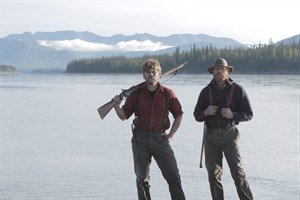
Adventurers Brett Rogers (left) and Cliff Quinn are shown in a handout photo. For some, "7 Days in Hell" might refer to shopping days leading up to Christmas, or the time the cable went out.For Rogers and Quinn, however, it was a gruelling survival mission, deep in the Yukon wilderness. THE CANADIAN PRESS/HO
December 12, 2013 - 8:40 AM
For some, "7 Days in Hell" might refer to shopping days leading up to Christmas, or the time the cable went out.
For Brett Rogers and Cliff Quinn, however, it was a gruelling survival mission, deep in the Yukon wilderness. The two men rejected all modern day conveniences and safety measures, travelling without today's handy hiking gear and supplies. Instead, they forced themselves to survive in the wild much as the Yukon gold rush pan handlers had to do 130 years ago.
On top of all that, they had to be their own camera crew, lugging video and audio recording gear and pointing it at each other as they captured their experience.
It all adds up to "7 Days in Hell," airing Tuesday on History (check local listings).
Rogers has had a Yukon itch for years. When he was 18, he travelled from Toronto to Whitehorse — by bus!
"It's 72 hours, I think," he says. "It was the cheapest way to get to the Yukon back then. I was in high school and it was $125 dollars for a one way ticket anywhere in Canada."
Rogers' love of the great outdoors has led him to test himself in all kinds of wilderness journeys. He's led expeditions on the Mackenzie, Yukon, Mississippi and Ganges Rivers with little but his wits in terms of provisions.
He invited Quinn, the older brother of an old high school pal, along on this adventure. The two survived earlier expeditions along the Mississippi and into India. History was pleased with the pairing.
Rogers feels he's more of a "white collar dreamer," with Quinn the "blue collar builder." Their interplay on camera is all part of the story.
The journey was rough. Setting out in late August, with the days already getting short and the nights chilly, the two had to find their own food and water. The historical set up — a prerequisite at the channel — had them posing as Yukon gold prospectors from 1885 who were trying to find a way back to civilization after a fire destroyed their supplies.
Much of their journey took them along river beds. The cold waters were hard on their old leather boots, but the good news was fresh water was always handy.
"It just goes to show you that so much of our hunger is mental," says Rogers, "and, at the end of the day, the human body really just needs water to function for a period of seven days."
While the two also ate berries, Rogers says he shed 6.8 kilograms over the trek, packing it all back on again — and then some — "the week after I got back."
The two wore period clothing and fashioned makeshift back packs out of burlap and rope — not exactly the kind of lightweight, comfortable hiking gear found in today's modern fitness depot.
Rogers carried an old rifle but fortunately did not need to scare off any bears along the way. What they did encounter were hundreds of sand cranes.
"They have a big breeding area in the Yukon," he says. "They're very ancient looking."
Bears and moose have big territories they cover but kept their distance during this expedition. Hearing the cranes at night was "a bit spooky," says Rogers, but "also very calming." It was good to be reminded that, "Hey — we're not alone.'"
Rogers has worked on other reality shows, including "Mighty Planes," handling cameras and other equipment. The University of Waterloo geography major has been planning his own series for some time, always taking cameras and sharpening his recording skills on his own trips into the bush.
One of the toughest parts of this expedition, he says, was having to wake up extra early to set up cameras just to record waking up.
Rogers says he owes a debt to "Survivorman" Les Stroud, who has mentored him over the years, even lending him cameras and other equipment.
"Les taught me the importance of doing what you believe in as well as the importance of doing something genuine."
After shooting this Yukon survivor mission last August, Rogers says he emailed Stroud, suggesting he was crazy to do his survivor missions alone. "At least I had Cliff with me," says Rogers.
He hopes this special will lead to a series and already has several ideas lined up for future "7 Days" missions.
"I've always loved the idea of re-creating what it would be like as cod fishermen being shipwrecked off the coast of Newfoundland," he suggests.
Not that you can ever know exactly how these risky missions will turn out.
"One thing I've learned doing expeditions," he says, "is never assume it's going to go as planned. Expect the unexpected. Mother Nature's the boss out there and whatever she wants to do, she's going to do."
___
Bill Brioux is a freelance TV columnist based in Brampton, Ont.
News from © The Canadian Press, 2013